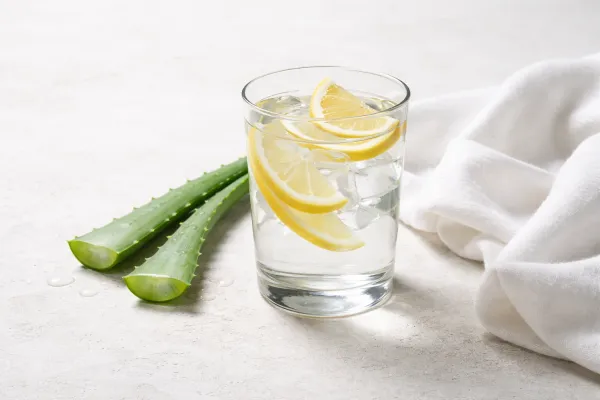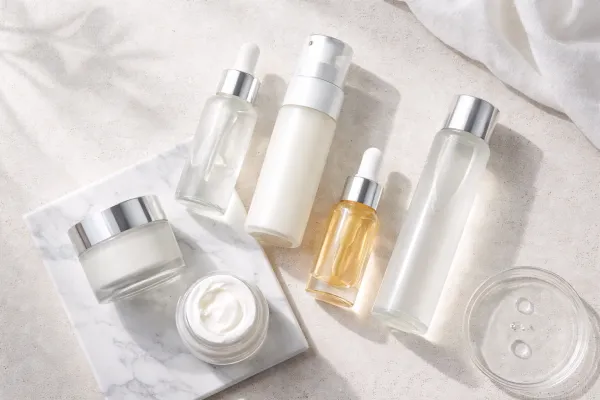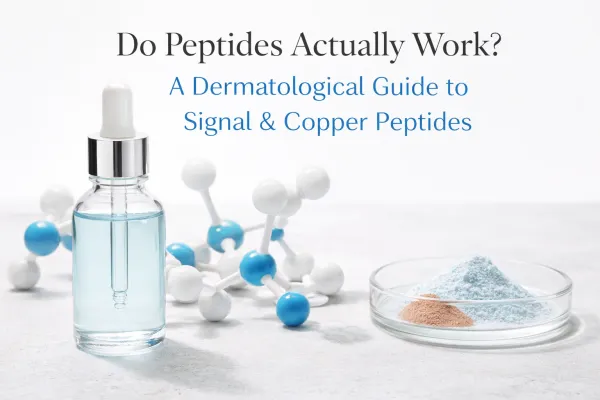Restore Your Skin Barrier: A Simple and Effective Guide
Learn how to restore your skin barrier with expert tips and techniques. Discover the best ingredients and routines for healthy, resilient skin.

Ever felt like your skin is just *off*? Maybe it's dry, itchy, or breaking out like crazy. It could be that your skin barrier, that crucial outer layer that protects you, is damaged.
Think of it like the wall around your castle – if it's crumbling, all sorts of problems can get in. But don't worry, it's not a lost cause.
We're going to dive deep into how to restore your skin barrier, and I'll share some expert tips I've learned over the years. It's not about quick fixes; it's about understanding what your skin needs and giving it the right tools to heal itself.
Key Takeaways: How to Restore Your Skin Barrier
- Gentle is Key: Harsh cleansers and scrubs are your enemy. Opt for gentle, pH-balanced cleansers.
- Hydration is Non-Negotiable: Hyaluronic acid, glycerin, and ceramides are your best friends.
- Moisturize Like It's Your Job: Use barrier-repairing ingredients like niacinamide, shea butter, and squalane.
- Nourish and Protect: Facial oils, antioxidants, and sunscreen are essential.
- Repairing Agents are Your Allies: Ceramides, peptides, and retinoids can help speed up the process.
- Advanced Treatments Can Help: For severe damage, consider options like Opus Plasma™.
- Avoid Irritants: Steer clear of harsh alcohols, sulfates, and fragrances.
- Consistency is Crucial: Stick to your routine and be patient.
Gentle Cleansing and Exfoliation: The Foundation of Skin Barrier Repair
The first step in any skin barrier restoration journey is to take a long, hard look at your cleansing routine. Are you using a cleanser that feels like it's stripping your skin bare?
That squeaky-clean feeling isn't a good sign. You need a gentle, pH-balanced cleanser that removes dirt and impurities without taking away your skin's natural oils. Think of it like washing a delicate fabric – you wouldn't use harsh chemicals, right?

The same applies to your skin. Avoid those abrasive scrubs that feel like sandpaper. Instead, go for mild chemical exfoliants with alpha or beta hydroxy acids. These gently dissolve dead skin cells, revealing fresh, healthy skin underneath. I've seen so many people over-exfoliate and damage their skin barrier further, so trust me on this one, less is more.
- Gentle Cleansers: Look for cleansers labeled "pH-balanced," "non-stripping," or "for sensitive skin."
- Avoid: Harsh scrubs, cleansers with sulfates, and alcohol-based toners.
- Mild Exfoliants: Opt for products with AHAs (like glycolic or lactic acid) or BHAs (like salicylic acid).
- Frequency: Exfoliate 1-2 times a week, not daily.
“The skin barrier is like a brick wall, and the bricks are skin cells, while the mortar is made of lipids. When the mortar is damaged, the wall becomes weak.” - Dr. Leslie Baumann
For example, I had a client who was using a very harsh scrub every single day, and her skin was constantly red and irritated. Once we switched her to a gentle cleanser and a mild chemical exfoliant, her skin started to heal within weeks. It's amazing what a difference a simple change can make.
Consider checking out some of the top cleansers for teenage skin, as they are often formulated to be gentle, or if you have acne, the best cleansers for acne prone skin will be a great option.
Hydrating and Moisturizing: The Dynamic Duo for a Healthy Skin Barrier
Hydration and moisturization are the two pillars of skin barrier repair. Hydration is about drawing water into your skin, while moisturization is about locking that water in. Think of it like a sponge – you need to soak it in water (hydration) and then seal it in a bag (moisturization) to keep it plump.
Start with a hydrating serum or essence containing ingredients like hyaluronic acid, glycerin, or ceramides. These are like magnets for moisture, pulling water from the air and deeper layers of your skin. Then, follow up with a nourishing moisturizer that has barrier-repairing ingredients like niacinamide, shea butter, or squalane.

These ingredients help strengthen the skin barrier, improve its function, and prevent moisture loss. I always tell my clients that if you're not moisturizing, you're not doing skincare right. It's that important.
| Ingredient | Function | Benefits |
|---|---|---|
| Hyaluronic Acid | Humectant | Attracts and retains moisture |
| Glycerin | Humectant | Hydrates and softens skin |
| Ceramides | Lipid | Strengthens skin barrier |
| Niacinamide | Vitamin B3 | Reduces inflammation, improves barrier function |
| Shea Butter | Emollient | Nourishes and moisturizes |
| Squalane | Emollient | Locks in moisture, softens skin |
I remember when I first started learning about skincare, I thought all moisturizers were the same. Boy, was I wrong! The right moisturizer can make all the difference.
For example, if you are a teenager, you might want to check out the best moisturizers for teenage skin, or if you have dry skin, you might want to check out the best moisturizers for dry skin.
“Moisturization is crucial for skin barrier repair. It reduces permeability and subsequent allergen penetration.” - Karger
Nourishing and Protecting: Fueling Your Skin's Recovery
Think of your skin barrier like a garden – it needs the right nutrients to thrive. In addition to hydration and moisturization, you need to nourish your skin with vital nutrients and protect it from further damage. This is where facial oils and serums come in. Look for products that are rich in antioxidants and essential fatty acids. These help repair and rejuvenate your skin.
Think of them like vitamins for your face. And don't forget the sunscreen! Sun damage is one of the biggest culprits when it comes to a weakened skin barrier. Make sure you're using a broad-spectrum sunscreen with an SPF of at least 30 every single day, even when it's cloudy.
It's not just about preventing sunburn; it's about protecting your skin barrier from the harmful effects of UV rays. I've seen so many people skip sunscreen, and they always regret it later. It's the most important step in any skincare routine.
- Nutrient-Rich Oils: Look for oils like rosehip, jojoba, or argan oil.
- Antioxidant Serums: Vitamin C, Vitamin E, and ferulic acid are great options.
- Sun Protection: Use a broad-spectrum sunscreen with SPF 30 or higher daily.
- Reapply: Reapply sunscreen every two hours, especially if you're sweating or swimming.
I had a client who was struggling with hyperpigmentation and a damaged skin barrier. Once we incorporated a vitamin C serum and consistent sunscreen use into her routine, her skin started to transform. It was like watching a flower bloom.
If you are looking for the best sunscreens, check out the best sunscreens for darker skin, or the best sunscreen for oily skin.
Adding Repairing Agents: The Power Players for Skin Barrier Restoration
Now, let's talk about the heavy hitters – the repairing agents. These are the ingredients that can really expedite the skin barrier restoration process. Ceramides are like the mortar that holds your skin cells together, so they're essential for a healthy barrier.
Niacinamide is a multi-tasker that reduces inflammation, improves barrier function, and boosts collagen. Peptides are like little messengers that tell your skin cells to produce more collagen and elastin. And retinoids are the gold standard for skin rejuvenation, helping to increase cell turnover and improve overall skin health.
But here's the key: introduce these ingredients gradually. Don't go throwing everything at your skin at once. Start with one new product at a time and monitor how your skin responds. It's like building a house – you need to lay the foundation before you start adding the fancy stuff. I've seen so many people get impatient and overwhelm their skin, so take it slow and steady.
- Ceramides: Look for products that specifically mention ceramides.
- Niacinamide: Start with a low concentration (2-5%) and gradually increase.
- Peptides: Look for products with a blend of different peptides.
- Retinoids: Start with a low concentration (0.025%) and use it 1-2 times a week, gradually increasing frequency.
- Introduce Slowly: Add one new product at a time and wait a week before adding another.
“The skin barrier is a complex structure, and its repair requires a multi-faceted approach.” - Journal of Drugs in Dermatology
For example, I had a client who was experiencing severe dryness and flakiness. We introduced a ceramide-rich moisturizer and a low-concentration retinoid slowly, and her skin completely transformed. She went from having a constantly irritated skin to having a healthy, glowing complexion.
If you're curious about peptides, check out the guide to peptides for anti-aging, or if you want to learn more about retinoids, check out the retinoids for acne treatment.
Advanced Treatments: When Extra Help is Needed
Sometimes, despite our best efforts, the skin barrier damage is severe and requires more advanced treatments. This is where technologies like Opus Plasma™ can be beneficial. This treatment uses plasma energy to create controlled micro-injuries in the skin, which stimulates collagen production and promotes skin regeneration. It's like giving your skin a little nudge to kickstart its healing process.
While these treatments can be effective, they're not for everyone. It's important to consult with a dermatologist or skincare professional to determine if they're right for you. I always tell my clients that advanced treatments are not a substitute for a good skincare routine; they're an enhancement.
You still need to be consistent with your daily routine to maintain the results. These treatments can help to improve the skin’s texture, tone, and overall resilience.
- Opus Plasma™: Uses plasma energy to stimulate collagen production.
- Consult a Professional: Always consult with a dermatologist before undergoing advanced treatments.
- Not a Substitute: Advanced treatments are not a substitute for a good skincare routine.
- Realistic Expectations: Understand that results may vary and take time.
I've seen amazing results with advanced treatments, but it's crucial to have realistic expectations and to be patient. It's not a magic wand; it's a tool that can help your skin heal faster. If you are curious about other treatments, check out the exploring fractional laser therapy, or the benefits of laser skin resurfacing.
“Advanced treatments can be beneficial for severe skin barrier damage, but they should always be done under the guidance of a professional.” - Westlake Dermatology
Maintaining Proper Moisture and Avoiding Irritants: The Daily Habits That Matter
Restoring your skin barrier isn't just about what you put on your skin; it's also about your daily habits. Hot showers can strip your skin of its natural oils, so opt for lukewarm water instead. Moisturize regularly, especially after showering or washing your face. And pay attention to your diet.
Eating whole, healthy foods provides your skin with the nutrients it needs to repair itself. Also, be mindful of the products you're using. Harsh ingredients like alcohols, sulfates, and fragrances can irritate your skin and hinder the healing process.
I always tell my clients to read the ingredient lists carefully and to avoid anything that sounds harsh or irritating. It's about being kind to your skin and giving it the environment it needs to thrive. It's a marathon, not a sprint.
| Habit | Why it Matters |
|---|---|
| Lukewarm Showers | Avoids stripping skin of natural oils |
| Regular Moisturizing | Maintains hydration and barrier function |
| Healthy Diet | Provides essential nutrients for skin repair |
| Avoid Harsh Ingredients | Prevents irritation and inflammation |
I had a client who was constantly battling dry, itchy skin. Once we adjusted her shower habits and eliminated harsh products from her routine, her skin started to calm down.
It's amazing how much of a difference these small changes can make. If you are curious about what to avoid, check out the skincare products to avoid for darker skin, or the teenage skincare mistakes to avoid.
The Role of Moisturization: Sealing the Deal for Skin Barrier Health
Let's dive deeper into the role of moisturization in skin barrier repair. It's not just about slapping on any old cream; it's about using the right ingredients that can actually help your skin.
Moisturizers work by creating a moisture-sealing barrier on the skin's surface, which reduces water loss and prevents allergens from penetrating. Ingredients like emollients, occlusives, and humectants are key players here. Emollients soften and smooth the skin, occlusives create a protective barrier, and humectants draw moisture into the skin.
When these ingredients are incorporated into the lipid barrier, they promote the synthesis and secretion of stratum corneum (SC) lipids, which are essential for a healthy skin barrier. It's like giving your skin the building blocks it needs to repair itself. I always tell my clients that moisturization is the foundation of any good skincare routine, and it's especially important when you're trying to restore a damaged skin barrier.
- Emollients: Soften and smooth the skin (e.g., shea butter, squalane).
- Occlusives: Create a protective barrier (e.g., petrolatum, beeswax).
- Humectants: Draw moisture into the skin (e.g., hyaluronic acid, glycerin).
- SC Lipids: Promote the synthesis and secretion of stratum corneum lipids.
I remember when I was first learning about skincare, I didn't really understand the difference between these types of ingredients. Once I started incorporating them into my routine, my skin started to feel so much more hydrated and healthy.
If you are curious about the different types of moisturizers, check out the best moisturizers for oily skin, or the best moisturizers for sensitive skin.
“Moisturizers form a moisture-sealing barrier, reducing permeability and allergen penetration.” - Karger
The Importance of Consistency: Patience is a Virtue
Restoring your skin barrier isn't a quick fix; it's a journey. It requires consistency, patience, and a willingness to listen to your skin. Don't expect to see results overnight. It takes time for your skin to heal and rebuild its barrier.
Stick to your routine, be patient, and don't get discouraged if you don't see immediate changes. It's like training for a marathon – you need to put in the work every day to see progress. I always tell my clients that consistency is key. It's not about doing everything perfectly; it's about doing something consistently.
It's about being kind to your skin and giving it the time it needs to heal. It is also important to understand the signs of a damaged skin barrier, so you can identify when you need to take action.
- Stick to Your Routine: Don't skip steps or get lazy.
- Be Patient: Results take time, so don't get discouraged.
- Listen to Your Skin: Pay attention to how your skin reacts to products.
- Adjust as Needed: Don't be afraid to tweak your routine if something isn't working.
I've seen so many people give up on their skincare routine because they didn't see results right away. But those who stick with it always see the most amazing transformations. It's about the long game, not the short game.
If you are curious about how to start a skincare routine, check out the how to do skincare for beginners, or the beginners skincare routine for teens.
Personal Anecdote: My Own Skin Barrier Journey
I'll be honest, I haven't always had perfect skin. Like many of you, I've struggled with breakouts, dryness, and sensitivity. There was a time when I was over-exfoliating and using harsh products, and my skin was a complete mess. It was red, irritated, and constantly breaking out.
It was only when I started to learn about the importance of the skin barrier that I realized what I was doing wrong. I switched to a gentle cleanser, incorporated hydrating serums and moisturizers, and started using sunscreen religiously. It took time, but my skin eventually healed.
It was a long and sometimes frustrating journey, but it taught me so much about the importance of being kind to your skin. It's why I'm so passionate about helping others restore their skin barrier. I know firsthand how much of a difference it can make.
“The skin barrier is a dynamic and complex system that requires a holistic approach to repair.” - Dr. Leslie Baumann
I've learned that skincare is not about chasing perfection; it's about finding what works for you and being consistent. It's about understanding your skin and giving it the care it needs. If you are struggling with acne, check out the skincare routine for acne prone skin, or the how to treat teenage breakouts.

Conclusion: Your Journey to a Healthier Skin Barrier Starts Now
Restoring your skin barrier is a journey that requires patience, consistency, and a willingness to learn. It's not about quick fixes or miracle products; it's about understanding what your skin needs and giving it the right tools to heal itself.
By following these steps – gentle cleansing, hydration, moisturization, nourishment, protection, and targeted repair – you can effectively restore and strengthen your skin barrier.
Remember, it's not about achieving perfection; it's about achieving healthy, resilient skin. And that, my friends, is something we can all strive for. So, take a deep breath, be kind to your skin, and start your skin barrier restoration journey today. You've got this!
Frequently Asked Questions
How long does it take to restore a damaged skin barrier?
The time it takes to restore a damaged skin barrier varies depending on the severity of the damage and your individual skin. It could take anywhere from a few weeks to a few months. Consistency and patience are key. Results can vary depending on the severity of the barrier damage and the specific product used. Some people may notice improvements within days, while others may take several weeks. Consistency is key. It's like rebuilding a house; it takes time and effort to see the final result. You should use your product at least twice a day.
Can I use too many products when trying to repair my skin barrier?
Yes, you can absolutely overdo it. Introducing too many new products at once can overwhelm your skin and cause further irritation. It's best to introduce new products gradually and monitor how your skin responds. Avoid over-exfoliating to prevent further skin damage. Stick to a simple, gentle routine until your barrier heals. Because many beauty products contain preservatives, chemicals or fragrances that could irritate or dry out your skin, it's a good idea to introduce new products one at a time.
What are the signs of a damaged skin barrier?
Common signs include dryness, flakiness, redness, irritation, sensitivity, breakouts, and a tight or uncomfortable feeling. If you're experiencing these symptoms, it's a good idea to reassess your skincare routine. When your skin barrier is compromised, you may experience: Dryness and flakiness, Sensitivity to products or environmental factors, Increased redness or irritation, More frequent breakouts or infections. These are clear signs that your protective barrier becomes less effective, leaving your skin vulnerable to damage and unpleasant conditions.
Do I need to see a dermatologist to restore my skin barrier?
While you can often restore your skin barrier with a good skincare routine and consistent habits, it's always a good idea to consult with a dermatologist if you're experiencing severe or persistent issues. They can provide personalized advice and recommend advanced treatments if needed. For mild cases, you can repair a compromised barrier with gentle products and good habits. However, if you experience: Persistent skin sensitivity, Repeated skin infections, Chronic conditions like dermatitis, ...it's time to see a dermatologist. They can tailor treatments to your skin's needs. Dermatologists are essential for diagnosing and treating conditions related to a compromised skin barrier.
Can diet affect my skin barrier?
Yes, absolutely. A diet rich in whole, healthy foods provides your skin with the nutrients it needs to repair itself. Conversely, a diet high in processed foods, sugar, and unhealthy fats can contribute to inflammation and weaken your skin barrier. While your diet won't directly alter your skin's pH, it can impact your overall health, which in turn affects your skin. A balanced diet rich in antioxidants, vitamins, and essential fatty acids supports healthy skin function. Staying hydrated by drinking plenty of water is also crucial. Besides using the right moisturizer, several lifestyle factors can support barrier repair: Healthy Diet: Eat a balanced diet rich in omega-3 fatty acids, Hydration: Drink plenty of water.





